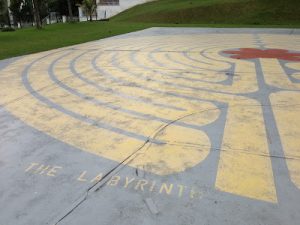By Alex Tang
“O God, you will show me the path of life and fill me with joy in your presence.”

Labyrinth at Lifesprings Canossian Spirituality Centre, Singapore
A labyrinth is a pattern on the ground in which there is a long pathway that leads to the centre. Once reaching the centre, you may follow path back to the entrance which is also the exit. Generally, there are three stages to the walk: releasing on the way in, receiving in the center and returning when you follow the path back out of the center of the labyrinth. Symbolically, and sometimes actually, you are taking back out into the world that which you have received.
The first documented example of a labyrinth we have is from 324 A.D. when Christians placed a labyrinth on the floor of their church in Algiers, North Africa. Many of the early church fathers including Ambrose, Gregory of Nyssa, and Jerome wrote about labyrinths as a metaphor to illustrate important Christian beliefs.
There is no right way or wrong way to walk a labyrinth. Use the labyrinth in any way that meets your needs while being respectful of others who may be walking on the path. You may stop anywhere along the path to mediate, pray or be in silence. You will often meet others walking the path in the opposite direction. Simply step around them. Walk at your own pace; you may even pass others who may be in front of you. Take your time. Walk slowly. Do what feels natural to you — some walk steadily, some cover their faces with scarves, some dance, some twirl and dance, some stop often. At the center you may sit, kneel, stand, change positions or directions, pray, meditate, or do silent reading or writing.
“Be still and know that I am God.”
Psalm 46:10
To prepare for walking, you may want to sit quietly to reflect before stepping onto the labyrinth. Some people come with questions, others just to slow down and take time out from a busy life. Some come to find strength to take the next step. Many come during times of grief and loss.
In walking the labyrinth with the psalms, we are to read a psalm while walking the labyrinth. Select a psalm from the list below or choose one of your own.
Psalms 1; 8; 23; 27; 42; 46; 48; 63; 84; 108; 111; 139; 143; 147
The idea is to stick to meditating/praying one particular psalm for the whole duration of this walk, using it to pray, meditate and contemplate. Read the psalm slowly. Meditate and listen to each word, sentence and paragraph. Restart at the beginning of the psalm when you have reached the end.
